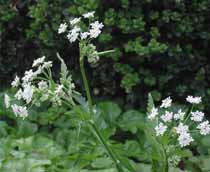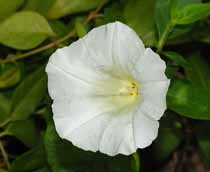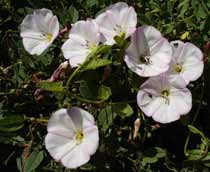
See if you can get full marks in this informative quiz.
Weeds - Perennial Garden Weeds
Perennial garden weeds are the most troublesome kind. Many of them have strong root systems that can regenerate growth even after everything above ground is destroyed. The roots often travel long distances underground and if all that were not enough they often propagate by seed as well!
To see a larger image, click on the picture.
1 .
Can you name this perennial garden weed?
Ground elder
Bramble
Common nettle
Japanese knotweed
- Latin Name: Aegopodium podagraria.
- A member of the carrot family that grows in shady places.
- Does not usually grow in well-cultivated areas but is difficult to get rid of once established.
- Presents a real problem when established in a perennial border.
- Supposedly helps in the treatment of arthritis and gout.
2 .
Can you name this perennial garden weed?
Cow parsley
Bramble
Common nettle
Ground elder
- Latin Name: Urtica dioica.
- Hollow hairs on the leaves and stems act like hypodermic needles that inject irritating histamines into the skin.
- Several different varieties are found throughout the country.
- Because it is a very important food plant for butterfly larvae (peacock and small tortoiseshell in particular) it deserves a place in all large gardens.
3 .
Can you name this perennial garden weed?
Japanese knotweed
Cow parsley
Ribwort plantain
Broad-leaved-dock
- Latin Name: Rumex obtusifolius.
- Has large leaves with some of the bottom ones being tinged with red.
- It is a poor competitor to other weeds but once established it is difficult to kill because it has a tap root that can extend to over a metre.
- Stings (particularly from nettles) can be made less irritating by vigorously rubbing the leaves on the skin.
4 .
Can you name this perennial garden weed?
Common nettle
Ribwort plantain
Common ragwort
Ground elder
- Latin Name: Senecio jacobaea.
- Different parts of the country have various names for the plant including stinking nanny, staggerwort, dog standard, cankerwort and stammerwort.
- The leaves smell very unpleasant!
- Thrives on alkali soils and seldom found on acid soils.
- A single plant can produce tens of thousands of seeds per year.
5 .
Can you name this perennial garden weed?
Ribwort Plantain
Common ragwort
Common nettle
Field bindweed
- Latin Name: Plantago lanceolata.
- Sometimes called ribgrass or tinker-tailor grass.
- Has hairy flower stems between 10 and 40 cm long.
- Very drought resistant and is frequently found on dry embankments.
- It is estimated that seeds can exist in soil for more than 50 years before germinating.
6 .
Can you name this perennial garden weed?
Bramble
Japanese knotweed
Ribwort plantain
Broad-leaved dock
- Latin Name: Fallopia japonica.
- Otherwise known as Himalayan fleece vine, monkeyweed, elephant ears and pea shooters.
- Originated in eastern Asia but is now classified as an invasive species in many countries including the UK.
- Recognized by the World Conservation Union as one of the worst invasive species.
7 .
Can you name this perennial garden weed?
Japanese knotweed
Ground elder
Common ragwort
Bramble
- Latin Name: Rubus fruticosus.
- Don't let the attractive flowers fool you - the wild plants bear lethal thorns!
- Varieties have been bred for garden use that have few, if any, thorns.
- Bears edible fruit (blackberries) in the autumn.
- The roots are perennial but the fruit is borne on stems that are in their second year.
8 .
Can you name this perennial garden weed?
Cow parsley
Common ragwort
Ribwort plantain
Bramble
- Latin Name: Anthriscus sylvestris.
- Sometimes known as wild chervil, keck or mother-die.
- Hollow stems carry umbels of white flowers in early summer.
- Very often found in places that are not frequently cultivated such as dykes and roadside verges.
- It does not like being disturbed and digging usually eradicates it.
9 .
Can you name this perennial garden weed?
Field bindweed
Ribwort plantain
Hedge bindweed
common ragwort
- Latin Name: Convolvulus sepium.
- Often seen in the countryside growing up hedges and in the garden climbing on fruit trees and herbaceous plants.
- Stems can grow up to 4 metres in a single year and it is quite capable of pulling down the plants up which it is growing.
- Twines around branches and stems in an anti-clockwise direction - the opposite direction to which the sun goes around it!
10 .
Can you name this perennial garden weed?
Common nettle
Field bindweed
Hedge bindweed
Ribwort plantain
- Latin Name: Convolvulus arvensis.
- Climbs over crops and pulls them downwards.
- Grows in open fields and has an extensive root system that enables it to survive drought conditions.
- Used medicinally as a mild laxative.
- Spreads very rapidly with each plant producing upwards of 600 seeds per year.
- Trumpet shaped flowers are produced during the summer.
**Unlimited Quizzes Await You! 🚀**
Hey there, quiz champ! 🌟 You've already tackled today's free questions.
Ready for more?
Ready for more?
🔓 Unlock UNLIMITED Quizzes and challenge yourself every day. But that's
not all...
not all...
🔥 As a Subscriber you can join our thrilling "Daily Streak" against other
quizzers. Try to win a coveted spot on our Hall of Fame Page.
quizzers. Try to win a coveted spot on our Hall of Fame Page.
Don't miss out! Join us now and keep the fun rolling. 🎉
**Unlimited Quizzes Await You! 🚀**
Hey there, quiz champ! 🌟 You've already tackled today's free questions. Ready for more?
🔓 Unlock UNLIMITED Quizzes and challenge yourself every day. But that's not all...
🔥 As a Subscriber you can join our thrilling "Daily Streak" against other quizzers. Try to win a coveted spot on our Hall of Fame Page.
Don't miss out! Join us now and keep the fun rolling. 🎉

















